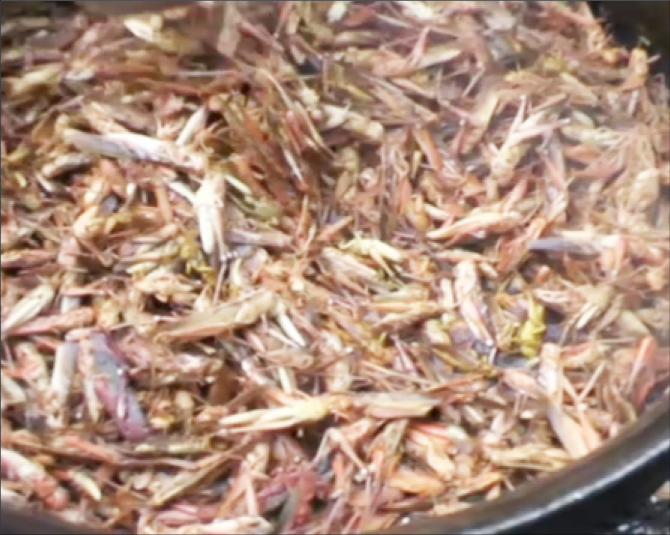Fried grasshopper: Katsina residents make fortune selling tasty insects
Grasshopper is a tropical insect which feeds on plants and other grasses in tropical and semi-arid regions which favours its existence. Over the years, this insect has become a tasty delicacy/snack consumed in Katsina and other parts of northern Nigeria and beyond. Daily Trust on Sunday spotlights this tasty snack. Grasshopper, which undoubtedly poses great […]

Fried grasshopper
Grasshopper is a tropical insect which feeds on plants and other grasses in tropical and semi-arid regions which favours its existence. Over the years, this insect has become a tasty delicacy/snack consumed in Katsina and other parts of northern Nigeria and beyond. Daily Trust on Sunday spotlights this tasty snack.
Grasshopper, which undoubtedly poses great danger to farmers, especially in its swarm, as it devours plants and other crops, is seen as a goldmine for some, as it is a sought-after commodity for residents of Katsina and other places. Young men and women pick, process, fry and sell it as a tasty delicacy.
Daily Trust on Sunday gathered that residents take advantage of the abundance of grasshoppers in Katsina State to run a lucrative business for domestic consumption as well as for export to make ends meet.
Investments needed to end violence against women, girls in Nigeria – NCWS
The laws, the rules, INEC, and the politicians (II)
In addition to its great taste, grasshopper also has some nutritional value according to a nutritionist, Fatima Maikaita.
“For those who cannot afford meat or fish, grasshopper is a good replacement because it has a lot of nutrients. It is part of protein diet,” she said.
Many believe that grasshopper tastes great when prepared well with ingredients as asserted by Hussaini Musa, after tasting the delicacy.
“Wow! This grasshopper tastes good! Let me tell you something you may not know. At times, some people are asked to avoid meat by doctors, especially those that have gout or uric acid. But such patients could take grasshopper without any problem, while deriving the same satisfaction.
“Considering the harsh economic situation in Nigeria today, many families, even well-to-do ones, now prefer grasshopper to chicken and beef. The secret is for you to find out,” he said.
There are over one million youths within the value chain of grasshopper business from supply to processing, distribution and so on. Those selling the product in Katsina are cashing out on a daily basis.
Abdul Hassan is physically challenged but has quit begging to start processing and selling fried grasshopper at several spots in Katsina city. Hassan is happy with the business.
“I am fully satisfied with this business. From it I bought houses, plots of land, got married, pay my children’s school fees and above all, I’m now an employer of labour.
Abdul Hassan is not only self-reliant now but has employed over 40 youths who work under him and from the business they pay school fees and meet other basic necessities.
These grasshoppers are not only consumed in Katsina but in other places like Kano, Kaduna, Abuja, Lagos and other cities in Nigeria.
Beyond that, thousands of bags of grasshoppers delivered to Katsina from Niger Republic and nearby bushes around Katsina are processed for export to England, America, Saudi Arabia and other African countries such as Cameroon, Ghana and Central Africa Republic.
Another young man who is into the grasshopper processing and selling business, Abubakar Abdulaziz, said “I have over 17 people working under me and we sell from N50, N100, N200, N500, N1000 up to N20, 000 and N50, 000 worth of the processed delicacy to customers.
“In fact, I have some merchants who buy and send it to their customers in Europe, Saudi Arabia, Ghana, Ivory Coast, USA and other countries.
As the business booms by the day, stakeholders decried high cost of vegetable oil and other ingredients as their major constraints, calling on the government to assist them at least with empowerment, in order for them not to be self-reliant only, but to employ more people, thereby helping the government to keep a lot of jobless youths off the streets.
